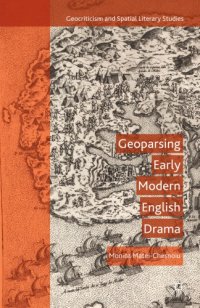Geo-spatial identity and early Modern European drama come together in this study of how cultural or political attachments are actively mediated through space. Matei-Chesnoiu traces the modulated representations of rivers, seas, mountains, and islands in sixteenth-century plays by Shakespeare, Jasper Fisher, Thomas May, and others.
The way people came to think about spatiality changed dramatically between 1550 and 1630 as a result of considerable social, economic, and political reformulation. Geoparsing Early Modern English Drama addresses the overarching question of how cultural and political attachments are actively mediated through space to affect representations of geography and landscape in early modern English drama. Breaking new ground, Monica Matei-Chesnoiu uses the geoparsing technique in computer science to assign spatial coordinates to in-text geographic references and the Moebius strip mathematical symbol to visualize the distorted symmetry and paradox involved in theatrical performance. Distilling the experience of lived space as dramatic experience, this book offers a new approach to the way people feel and relate to their environment across time and reveals a horizon of possibilities.
"Space may have surpassed time as the dominant category on our minds, so it is most fitting that Monica Matei-Chesnoiu's book should make us aware of the history and historicity of spaces and places. Theatre-going will never be the same again for readers of this comprehensive and admirably rich study of geographical space in early modern drama, since they will ineluctably be drawn to reflections on rivers that flow over the stage, encircling and hugging the cities evoked in the dramatic dialog."--Werner Bronnimann, University of St. Gallen and University of Basel, Switzerland "Monica Matei-Chesnoiu's broad and bold argument about the possibilities of the polyvocality and the polychronicity of English Renaissance theater as a site of radical possibility is a provocative extension to much recent scholarship on conceptualizing theatrical space. It deserves a wide readership of those interested in the impact of culture on the imagination."--Arthur F. Kinney, Thomas W. Copeland Professor of Literary History, University of Massachusetts Amherst, USA.
Read more... 